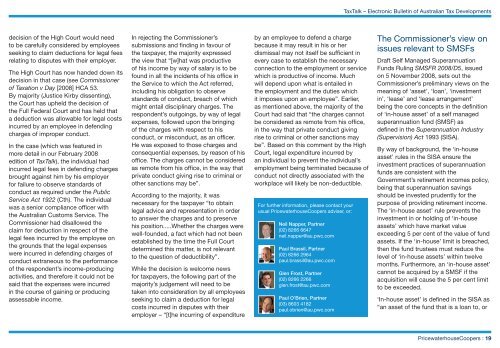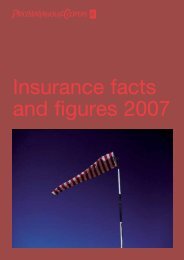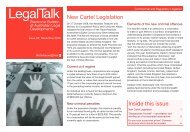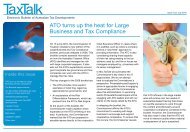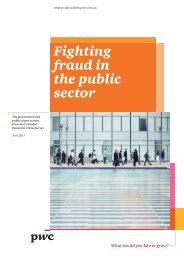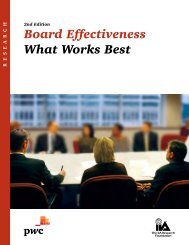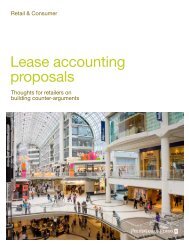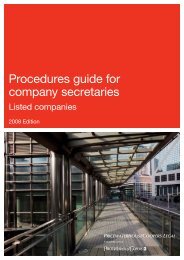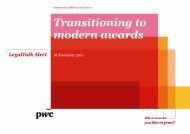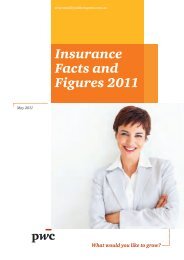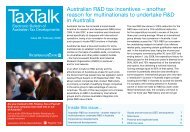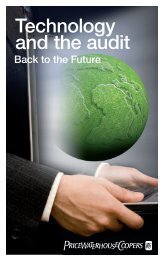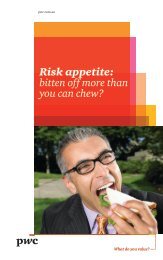Thin capitalisation: eroding asset values and increasing debt ... - PwC
Thin capitalisation: eroding asset values and increasing debt ... - PwC
Thin capitalisation: eroding asset values and increasing debt ... - PwC
You also want an ePaper? Increase the reach of your titles
YUMPU automatically turns print PDFs into web optimized ePapers that Google loves.
TaxTalk – Electronic Bulletin of Australian Tax Developments<br />
decision of the High Court would need<br />
to be carefully considered by employees<br />
seeking to claim deductions for legal fees<br />
relating to disputes with their employer.<br />
The High Court has now h<strong>and</strong>ed down its<br />
decision in that case (see Commissioner<br />
of Taxation v Day [2008] HCA 53.<br />
By majority (Justice Kirby dissenting),<br />
the Court has upheld the decision of<br />
the Full Federal Court <strong>and</strong> has held that<br />
a deduction was allowable for legal costs<br />
incurred by an employee in defending<br />
charges of improper conduct.<br />
In the case (which was featured in<br />
more detail in our February 2008<br />
edition of TaxTalk), the individual had<br />
incurred legal fees in defending charges<br />
brought against him by his employer<br />
for failure to observe st<strong>and</strong>ards of<br />
conduct as required under the Public<br />
Service Act 1922 (Cth). The individual<br />
was a senior compliance officer with<br />
the Australian Customs Service. The<br />
Commissioner had disallowed the<br />
claim for deduction in respect of the<br />
legal fees incurred by the employee on<br />
the grounds that the legal expenses<br />
were incurred in defending charges of<br />
conduct extraneous to the performance<br />
of the respondent’s income-producing<br />
activities, <strong>and</strong> therefore it could not be<br />
said that the expenses were incurred<br />
in the course of gaining or producing<br />
assessable income.<br />
In rejecting the Commissioner’s<br />
submissions <strong>and</strong> finding in favour of<br />
the taxpayer, the majority expressed<br />
the view that “[w]hat was productive<br />
of his income by way of salary is to be<br />
found in all the incidents of his office in<br />
the Service to which the Act referred,<br />
including his obligation to observe<br />
st<strong>and</strong>ards of conduct, breach of which<br />
might entail disciplinary charges. The<br />
respondent’s outgoings, by way of legal<br />
expenses, followed upon the bringing<br />
of the charges with respect to his<br />
conduct, or misconduct, as an officer.<br />
He was exposed to those charges <strong>and</strong><br />
consequential expenses, by reason of his<br />
office. The charges cannot be considered<br />
as remote from his office, in the way that<br />
private conduct giving rise to criminal or<br />
other sanctions may be”.<br />
According to the majority, it was<br />
necessary for the taxpayer “to obtain<br />
legal advice <strong>and</strong> representation in order<br />
to answer the charges <strong>and</strong> to preserve<br />
his position.....Whether the charges were<br />
well-founded, a fact which had not been<br />
established by the time the Full Court<br />
determined this matter, is not relevant<br />
to the question of deductibility”.<br />
While the decision is welcome news<br />
for taxpayers, the following part of the<br />
majority’s judgement will need to be<br />
taken into consideration by all employees<br />
seeking to claim a deduction for legal<br />
costs incurred in disputes with their<br />
employer – “[t]he incurring of expenditure<br />
by an employee to defend a charge<br />
because it may result in his or her<br />
dismissal may not itself be sufficient in<br />
every case to establish the necessary<br />
connection to the employment or service<br />
which is productive of income. Much<br />
will depend upon what is entailed in<br />
the employment <strong>and</strong> the duties which<br />
it imposes upon an employee”. Earlier,<br />
as mentioned above, the majority of the<br />
Court had said that “the charges cannot<br />
be considered as remote from his office,<br />
in the way that private conduct giving<br />
rise to criminal or other sanctions may<br />
be”. Based on this comment by the High<br />
Court, legal expenditure incurred by<br />
an individual to prevent the individual’s<br />
employment being terminated because of<br />
conduct not directly associated with the<br />
workplace will likely be non-deductible.<br />
For further information, please contact your<br />
usual PricewaterhouseCoopers adviser, or:<br />
Neil Napper, Partner<br />
(02) 8266 6647<br />
neil.napper@au.pwc.com<br />
Paul Brassil, Partner<br />
(02) 8266 2964<br />
paul.brassil@au.pwc.com<br />
Glen Frost, Partner<br />
(02) 8266 2266<br />
glen.frost@au.pwc.com<br />
Paul O’Brien, Partner<br />
(03) 8603 4182<br />
paul.obrien@au.pwc.com<br />
The Commissioner’s view on<br />
issues relevant to SMSFs<br />
Draft Self Managed Superannuation<br />
Funds Ruling SMSFR 2008/D5, issued<br />
on 5 November 2008, sets out the<br />
Commissioner’s preliminary views on the<br />
meaning of ‘<strong>asset</strong>’, ‘loan’, ‘investment<br />
in’, ‘lease’ <strong>and</strong> ‘lease arrangement’<br />
being the core concepts in the definition<br />
of ‘in-house <strong>asset</strong>’ of a self managed<br />
superannuation fund (SMSF) as<br />
defined in the Superannuation Industry<br />
(Supervision) Act 1993 (SISA).<br />
By way of background, the ‘in-house<br />
<strong>asset</strong>’ rules in the SISA ensure the<br />
investment practices of superannuation<br />
funds are consistent with the<br />
Government’s retirement incomes policy,<br />
being that superannuation savings<br />
should be invested prudently for the<br />
purpose of providing retirement income.<br />
The ‘in-house <strong>asset</strong>’ rule prevents the<br />
investment in or holding of ‘in-house<br />
<strong>asset</strong>s’ which have market value<br />
exceeding 5 per cent of the value of fund<br />
<strong>asset</strong>s. If the ‘in-house’ limit is breached,<br />
then the fund trustees must reduce the<br />
level of ‘in-house <strong>asset</strong>s’ within twelve<br />
months. Furthermore, an ‘in-house <strong>asset</strong>’<br />
cannot be acquired by a SMSF if the<br />
acquisition will cause the 5 per cent limit<br />
to be exceeded.<br />
‘In-house <strong>asset</strong>’ is defined in the SISA as<br />
“an <strong>asset</strong> of the fund that is a loan to, or<br />
PricewaterhouseCoopers : 19


